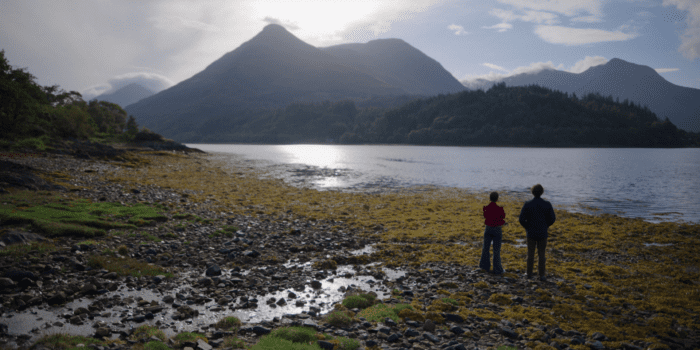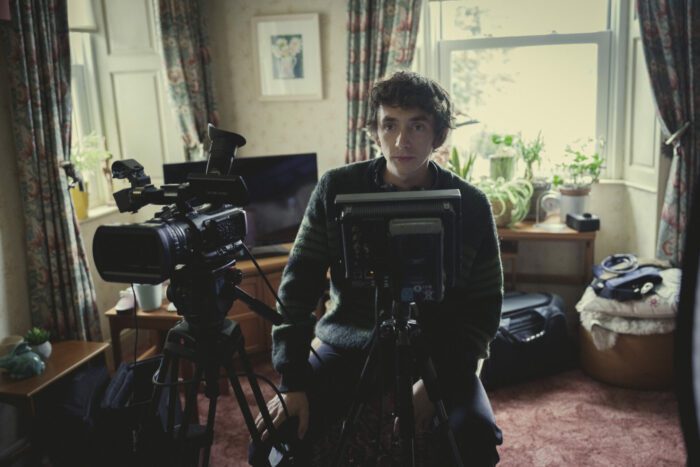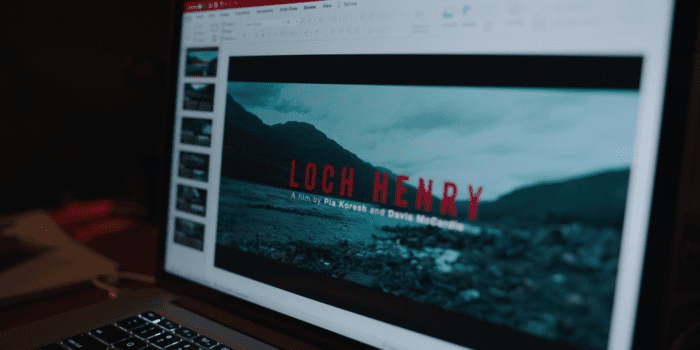The following recap and review contains spoilers for Black Mirror, “Loch Henry” (written by Charlie Brooker and directed by Sam Miller)
“Loch Henry” is the second episode of the sixth season of Black Mirror. Davis (Samuel Blenkin), a filmmaker, and his girlfriend, Pia (Myha’la Herrold), also a filmmaker, have come to his childhood home on their way to a nearby town to shoot a documentary about a man who cares for birds. It’s a beautiful, picturesque, sleepy Scottish town that’s practically deserted, a fact that baffles Pia.
The local pub owner (Daniel Portman) tells Pia and Davis that no one visits the town on vacation because of Iain Adair. The story goes: Iain was a quiet farm guy who kept to himself. Back when the town used to be filled with tourists, a young couple arrived to celebrate their honeymoon. A week passed and it was time for the couple to leave, but they were nowhere to be found. All of their belongings were left behind, but no one knew where they were. The story of the couple and Iain inspires Pia to change the focus of their documentary. Instead of the bird man, they’re going to tell the story of Iain Adair, known in the tabloids as the Loch Death Monster.
As one can imagine, Black Mirror uses this episode to mercilessly critique our current obsession with true crime. Now, not only are there shows about actual true crime, but shows like Based on a True Story… and Only Murders in the Building are satirizing this fascination people have with tales of murder. Pia insists that they will be the ones who do it right and give respect to the victims, unlike other shows that only exist as a cash grab. However, the idea of telling a true crime story the “right” way is filled with its own thorny set of rules. Is there even a “right” way to tell this story if there are no survivors? Is dredging up the past and forcing the relatives of victims to recount their trauma worth it? Are these filmmakers providing the proper support and psychological care to those involved? Even then, even if it is the best possible version, should we be telling these stories?

This is Black Mirror after all, so the episode’s not as simple and straightforward as two filmmakers shooting a documentary. Something far more sinister is afoot in this sleepy town and in the motives of the filmmakers. In the case of “Loch Henry,” the reveal is slowly played. There’s more humor in the beginning of the episode than can usually be expected in the Black Mirror universe, but it’s the final fifteen minutes of the episode where things take a sharp, decisive turn for the unsettling.
When Black Mirror is at its best, the show is asking questions about technology and its impact on human nature. The episodes that are the most memorable (“San Junipero,” “Fifteen Million Merits,” “White Bear,” “Nosedive”) take deep, insidious fears and expose them, a forced reckoning of the good and bad things about being alive. Unfortunately, “Loch Henry” is not one of those episodes, although that’s not for lack of potential. True crime is a fascinating subset of our pop culture. Not because of the actual events of the crimes, but for what they say about the way we consume content and what we define as content. With the growing popularity of apps like TikTok and Instagram, anything and everything is mined for the chance to go viral. Users don’t even need a grisly murder to get them interested, as we saw with West Elm Caleb. They just want to be able to argue, take sides, create their own conspiracies, and solve the mystery they’ve created.

Such is the case with “Loch Henry.” The episode’s twist is fairly obviously foreshadowed and doesn’t pack an emotional punch for the audience because it’s the expected turn of events. What made Black Mirror the phenomenon it has become were the moments when the shoe dropped. Because so much of the show’s success is built on delivering that moment, there will be episodes that miss the mark for audiences. Do we feel that way because we’re expecting something shocking? Or is that an unfair pressure to put on a series? To constantly have to create (mostly) standalone episodes that have a “gotcha” reveal is exhausting, but such is the burden of being Black Mirror.
“Loch Henry” places its full weight on the shock of the reveal without recognizing that the most disquieting events are what occurred beforehand. The twist of “Loch Henry” is that the murders hit Davis much closer than he initially realized: his mother (Monica Dolan) and father were involved with the capture and torture of random tourists. When pitching the docuseries in the middle of the episode, a producer tells Davis and Pia that they need to lean into the personal aspect of the story. By making Davis a relative of the torturers, it’s a shortcut to actually developing a strong thematic stance on the prevalence of true crime narratives.

The real horror of “Loch Henry” is in how quickly Davis and Pia abandoned their documentary about birds and the commodification of nature for a get rich quick scheme thanks to a tragedy that fell in their laps. As much as they’d like to lie to themselves and say this documentary will be different, the audience sees that it’s the same as every exploitative true crime series that came before it. The final product is filled with glossy drone shots of the Scottish town, a heavy emphasis on the scandalous details, and little regard for the victims. Just like the dime a dozen true crime docuseries that overpopulate Netflix.
It should make us uncomfortable that we continuously seek out entertainment that exploits real stories of abuse, violence, and murder. Especially when these shows and movies aren’t actively critiquing why these stories are so prevalent or what it is about violent murder that makes people intrigued. Instead, everyone and anyone is digging up local tragedies in the hopes of becoming the next Serial podcast. To what end? When will society have its fill of grisly deaths? It’s not enough for a nonfiction retelling of a tragedy. Once it enters the mainstream, a murder can be fictionalized in a multitude of formats. And for what? So the survivors and living relatives of victims can be re-traumatized for the entertainment of the majority of the population? How did we get to this point in life where people are earnestly making fan art of serial killers like Jeffrey Dahmer and Ted Bundy? This episode’s horror exists in the tsunami of true crime content it’s satirizing, but it’s a shame “Loch Henry” didn’t realize that. If any series could demonstrate the depths to which society’s true crime obsession has permeated pop culture, it would be Black Mirror, but it’s not “Loch Henry.”

